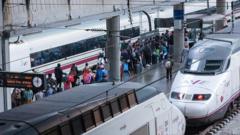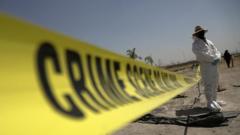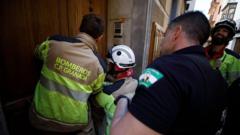Authorities are investigating the recent crash of a Jeju Air Boeing 737-800 in South Korea while examining potential causes such as bird strikes and maintenance issues, emphasizing the complexity of aviation safety.
Boeing 737-800 Crash in South Korea: Investigations Underway

Boeing 737-800 Crash in South Korea: Investigations Underway
A widely-used aircraft, the Boeing 737-800's safety record comes under scrutiny following a crash incident.
The Jeju Air Boeing 737-800 that crashed in southwestern South Korea has brought attention to a model that is extensively utilized worldwide. As per data from Cirium, there are approximately 28,000 passenger aircraft in active service globally, with 4,400 (about 15%) being Boeing 737-800s. This aircraft model is part of Boeing's Next-Generation 737 series and is the predecessor to the controversial 737 Max, which faced two fatal accidents leading to a global grounding of the fleet more than five years ago.
Currently, the Boeing 737-800 is employed by nearly 200 different airlines, with five operating within South Korea, including Jeju Air and Korean Air. The model's international popularity spans regions like Asia, Europe, and North America, with around 5,000 units delivered to customers since its introduction in 1998.
Najmedin Meshkati, a professor at the University of Southern California, noted that the 737-800 is perceived as a safe aircraft, boasting a strong safety history. The age range of the global fleet of these planes can span from 5 to over 27 years. The aircraft involved in the crash was 15 years old and was initially operated by Ryanair in Europe before being leased to Jeju Air in 2017 by SMBC Aviation Capital.
The cause of the crash is currently under investigation, with officials looking into various factors, including the possibility of a bird strike affecting the landing gear. Bird strikes pose a significant concern in aviation, as they can lead to damage such as cracked windshields. Airports often take preventive measures to keep birds away; for instance, Muan International Airport employs audio distress signals and also utilizes active measures, such as shooting, to disperse birds.
Meshkati indicated that while the 737-800 landing gear is known for its reliable design, maintenance lapses could potentially lead to complications in operation. He emphasized the critical nature of maintenance in the aviation sector, identifying it as a significant factor in many aviation accidents. Nonetheless, aviation experts caution against making hasty judgments about accidents since determining their causes typically requires extensive investigations that may span years to complete.
As the investigation progresses, Boeing has expressed its commitment to supporting Jeju Air during this challenging time, ensuring that any findings are thoroughly examined to enhance safety measures within the industry.




















